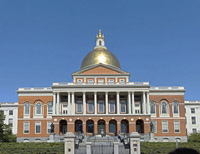Massachusetts
House Bill 2916: An Act to expand the bottle bill
| Bill Number and Name | House Bill 2916: An Act to expand the bottle bill |
|---|---|
| Primary Sponsor | Environment Committee |
Activity
1/20/2015 Senate Concurred
1/20/2015 Referred to the Committee on Telecommunications, Utilities and Energy
Beverages Covered
Under the current program beverages in containers of sixteen fluid ounces or more, but less than five gallons are covered, whereas the proposed changes would allow the program to accept beverage containers equal to or greater than four ounces but less than or equal to one hundred and twenty- eight ounces.
Deposits and Fees
- Deposit remains unchanged
- Creation of deposit transaction fund and water and wastewater infrastructure fund – funded by refund values on specific beverages
Redemption System
- Remains unchanged
Penalties
- No penalties
Summary
HB 2916 would alter the beverage container sizes allowed in the container deposit program. The bill would also create the deposit transaction fund and the water and wastewater infrastructure fund. The funds are to be kept separate from all other revenues and accounts and are to be made up of the refund value placed into the fund by bottlers and distributors for specified beverages.
House Bill 646: An Act improving recycling in the Commonwealth.
| Bill Number and Name | House Bill 646: An Act improving recycling in the Commonwealth. |
|---|---|
| Primary Sponsor | Representative Mark J. Cusack & Senator Moore |
Activity
1/20/2015 Senate Concurred
1/20/2015 Referred to Joint Committee on Environment, Natural Resources and Agriculture
Beverages Covered
Current law does not include non-carbonated non-alcoholic beverages, however the proposed law would include non-carbonated and carbonated, alcoholic, and non-alcoholic beverages in the program. Existing accepted beverage types will not be removed from the program.
Deposits and Fees
Implementation of a 1¢ recycling fee on all beverage containers would take effect July 1, 2016 and would terminate on June 30, 2019. After the three-year period has passed beverage containers would no longer be subject to the recycling fee.
Redemption System
Repeals language indicating every beverage container sold or offered for sale in the commonwealth shall have a refund value of not less than five cents, this bill also repeals language indicating consumers pay a deposit to a dealer when buying a beverage and will receive the refund when the container is returned.
Penalties
The bill amends provisions regarding penalties to include manufacturers. Current bill language includes bottlers, distributors, redemption centers, or dealers being affected by penalties.
- Penalty amount changed to a civil penalty of not more than $1,000 per violation. Current penalties consist of civil penalties of one hundred dollars for each container or twenty-five thousand dollars for each tender of containers.
Summary
HB 646 aims to establish a program that would increase recycling opportunities at public facilities, including stadiums, arenas, airports, parks, etc. The bill would also create the Municipal Recycling Enhancement Fund; the funds deposited would be managed by the Solid Waste Management Board and would be used for litter prevention and removal programs. The proposed bill also repeals language requiring bottlers and distributors to report transactions affecting the Deposit Transaction Fund each month. HB 646 and HB 2880 are similar to one another barring sunset clauses.
House Bill 2880: An Act improving recycling in the Commonwealth.
| Bill Number and Name | House Bill 2880: An Act improving recycling in the Commonwealth |
|---|---|
| Primary Sponsor | Representatives Colleen M. Garry & Chris Walsh |
Activity
1/20/2015 Senate Concurred
1/20/2015 Referred to the Committee on Telecommunications, Utilities and Energy
Beverages Covered
Current law does not include non-carbonated non-alcoholic beverages, however the proposed law would include non-carbonated beverages in the program. Existing accepted beverage types will not be removed from the program based on this bill.
Deposits and Fees
Implementation of a 1¢ recycling fee on all beverage containers would take effect July 1, 2016 and would terminate on June 30, 2019. After the three-year period has passed beverage containers would no longer be subject to the recycling fee.
Redemption System
Repeals language indicating every beverage container sold or offered for sale in the commonwealth shall have a refund value of not less than five cents, this bill also repeals language indicating consumers pay a deposit to a dealer when buying a beverage and will receive the refund when the container is returned.
Penalties
The bill amends provisions regarding penalties to include manufacturers. Current bill language includes bottlers, distributors, redemption centers, or dealers being affected by penalties.
- Penalty amount changed to a civil penalty of not more than $1,000 per violation. Current penalties consist of civil penalties of one hundred dollars for each container or twenty-five thousand dollars for each tender of containers.
Summary
HB 2880 aims to establish a program that would increase recycling opportunities at public facilities, including stadiums, arenas, airports, parks, etc. The bill would also create the Municipal Recycling Enhancement Fund; the funds deposited would be managed by the Solid Waste Management Board and would be used for litter prevention and removal programs. The proposed bill also repeals language requiring bottlers and distributors to report transactions affecting the Deposit Transaction Fund each month. HB 646 and HB 2880 are similar to one another barring sunset clauses.
House Bill 2875: An Act to increase recycling in the Commonwealth.
| Bill Number and Name | House Bill 2875: An Act to increase recycling in the Commonwealth. |
|---|---|
| Primary Sponsor | Representative Gloria L. Fox & Senator Cynthia S. Creem |
Activity
1/20/2015 Senate Concurred
1/20/2015 Referred to the Committee on Telecommunications, Utilities and Energy
Beverages Covered
HB 2875 would add non-carbonated non-alcoholic beverages to the program. The bill will not include wine and other alcoholic beverages to the program (other than beer and malt beverages).
Deposits and Fees
Remains unchanged
Redemption System
Remains unchanged
Penalties
Remains unchanged
Summary
The proposed legislation would give the Secretary of Environmental Affairs the duty of establishing a process to determine the diversion and redemption rates. The secretary’s duty would sunset when the redemption rate is greater or equal to the mean redemption rate of the most recent two-year period.
Product Stewardship Bill - House Bill 702: An Act to create a framework to re-allocate responsibility for discarded products.
| Bill Number and Name | House Bill 702: An Act to create a framework to re-allocate responsibility for discarded products. |
|---|---|
| Primary Sponsor | Representative Peter V. Kocot |
Activity
1/20/2015 Senate Concurred
1/20/2015 Referred to Joint Committee on Environment, Natural Resources, and Agriculture
Costs
All administrative, operational, and capital costs (including collection, transportation, recycling, reuse, and disposal) that are associated with the product stewardship programs must be paid by producers.
Penalties
Non-compliance of the provisions set forth within HB 702 will result in the filing of a petition with the Superior Court in order to obtain enforcement of penalties, consisting of a fine not less than $2,500 and not more than $25,000 for each day the violation is outstanding.
Summary
The aim of this proposed bill is to establish product stewardship programs which must be provided free of charge to covered entities when a product is sold or when the discarded products are delivered or collected for reuse, recycling, or disposal. Under this proposed bill, producers would be required to submit a product stewardship plan, including an outreach and education component, to the Department of Environmental Protection.


